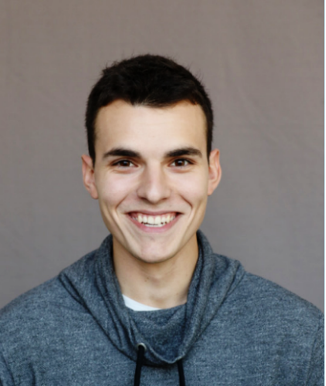|
Landeshauptstadt Dresden - www.dresden.de https://www.dresden.de/de/wirtschaft/wissenschaft/excellence-award/dea2020_tisma.php 19.03.2021 07:07:58 Uhr 10.04.2025 16:02:18 Uhr |
|
DEA-Preisträger 2020 Stufe Master/Diplom
Milos Tisma (TU – Molecular Bio-Engineering): "Classification of LexA mobility states during the SOS response in Escherichia coli using single-molecule tracking PALM"
Antibiotic-resistant bacteria are amongst leading health threats in current society, affecting individuals of any age or region. Though naturally occurring phenomenon, antibiotic resistance in bacteria has rapidly increased in the past 20 years due to misuse of antibiotic treatments in healthcare, agriculture and animal husbandry. This ultimately leads to all known antibiotics losing their potency. A universal pathway to acquiring resistance in all bacteria is termed – SOS response, and the main gene driving this process is lexA. LexA regulates the entire network of genes, solely dedicated to increasing mutations which can lead to resistance to virtually any antibiotic. Tackling antibiotic resistance would require inhibiting and preventing the SOS response, thereby disabling bacteria from changing and adapting to drug-treatments.
In order to advance the newest drug-development and inhibition strategies and prevent the current rise in antibiotic-resistant bacteria, I, together with my dear colleagues, set to learn more about this system and the way it is activated in the presence of the drug. We developed a novel genetic engineering strategy and used advanced microscopy techniques to study the system on the smallest scale. “Single-molecule tracking photoactivated localization microscopy” or smtPALM for short, is a state-of-the-art microscopy technique with an ability to “see” and track individual molecules with the precision of several billionths of a meter and a thousandth of a second. This incredible precision and speed allowed us to observe the very beginning of the bacterial reaction to antibiotics by monitoring the key protein in this process – a beforementioned, LexA.
We observed this molecule adopting multiple dynamic states, which change rapidly upon antibiotic treatment in a predictable and dosage-dependent manner. I further investigated this by applying higher antibiotic concentrations, higher treatment times and engineered new bacterial mutants with high susceptibility to observe the dynamics of the initial steps in acquiring the resistance.
A combination of genetic engineering, microbiology, advanced microscopy and biophysical modeling in my MSc project, had resulted in a first-time model of the dynamic states of LexA, a key protein in SOS regulatory network.
Botschaft für den DRESDEN EXCELLENCE AWARD
Having moved to Dresden two years ago as a foreigner, I was met with an incredible amount of support. Dresden’s scientific excellence in the field of Biophysics stood out to me the most, and provided the perfect environment for me to do research at a level that I have never been able to do previously. Originally, I come from Serbia, where I have pursued my undergraduate in Molecular Biology at the University of Belgrade. I was lucky enough to be presented with the incredible potential that research and science can offer to modern society early in my studies, but never had the opportunity to practically participate in research in Serbia. Nevertheless, I was motivated understand the underlying causes of many of the major health issues that the society is facing – viral infections and vaccines, antibiotic resistance, cancer, diabetes etc.
If recognized by this award, I would use it as a platform to represent Dresden and impact other foreign students, in my home country and where I am currently located, to explore Dresden’s scientific community which can offer tremendous opportunities for future scientists in various fields of research.
Nächste Ziele und Vorhaben
Following my MSc in Dresden, I became inspired by the interdisciplinary approaches in science, combining multiple fields such as biology, physics and computational science in tackling real-world problems and issues. For this reason, I continued my research and education as a PhD in a biophysics lab at the Technical University of Delft, Department of Bionanoscience in the lab of a Dist. Prof. Cees Dekker. My project, similarly, deals with the basic principles of bacterial function, how is the DNA organized and how it reacts to different conditions such as antibiotic presence.
I am highly motivated and fascinated with scientific research, and I hope to continue working in academia throughout my career until ultimately, I can teach and supervise my own students as a professor, transferring the enthusiasm and novel views onto them as some of the great professors have done for me.
Weitere Informationen
- Originaldarstellung des Preisträgers (*.pdf, 217 KB)







